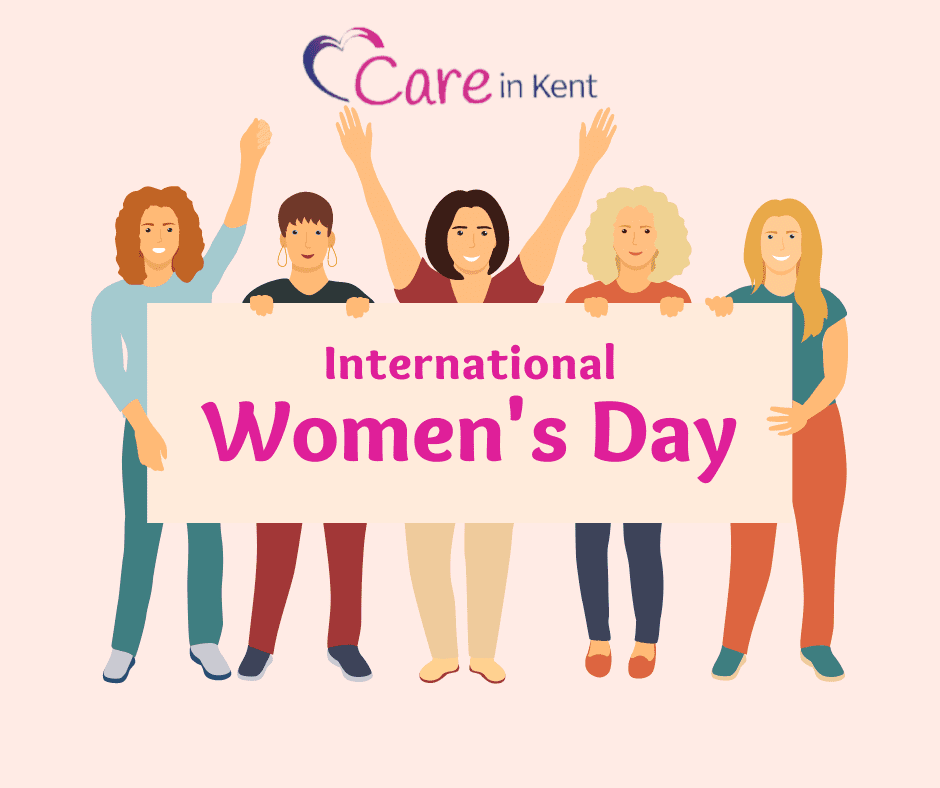March 8th sees the start of International Women’s Week, an annual celebration of the achievements of women today and throughout history around the globe.
Care In Kent wants to take the opportunity to rejoice in the caring roles that women from all walks of life fulfil throughout their daily lives. Not just as partners, friends, mothers, sisters and colleagues…but as carers of the vulnerable, frail and elderly, both professionally and personally.
Interestingly, and perhaps tellingly, women are more likely to take on caring roles than men. Society often looks to women as nurturers; as perhaps more patient, gentler, and kindlier than their male counterparts. While it’s true that these traits are more person than gender-specific, it is an idea that has prevailed through the ages – and one that seems to have stuck if the statistics are anything to go by:
The UK currently has approximately 6.5 million unpaid carers – 58% of which are women.
The economic value of this unpaid care is currently estimated to stand at a massive £77 billion per year – that’s nearly double what we spend on our armed forces!
Women are more likely than men to be ‘sandwich’ carers – caring for both children and elderly parents at the same time.
1 in 4 women aged 50-64 has caring responsibilities for elderly or disabled loved ones
72% of recipients of Carer’s Allowance are women
Women are more than twice as likely as men to have given up work to care for a loved one
Women are over 4 times more likely than men to have reduced their working hours to care for a loved one
Women have a 50/50 chance of providing care for an elder or disabled loved one by the age of 59, compared to men who have a 50/50 chance by the time they are 75
It’s fair to say that the role of caring disproportionately burdens women – and this is largely because of gender stereotypes that have been around since the dawn of time.
Typically, men are seen as the breadwinners, whereas women are viewed as homemakers or caregivers. For example, in situations where one parent works and the other stays at home to take care of the children, it is the woman who is the primary caregiver in 84% of cases – this rises to a whopping 93% of cases in situations where the child or children are disabled.
Women, of course, have contributed and continue to contribute to all types of services and industries, but it’s safe to say that when it comes to the care system, women are the backbone.
Shocking to know then, perhaps, that social care jobs – 80% of which are performed by women, and non-medical direct care and support-providing jobs – 95% of which are performed by women, are often labelled ‘unskilled’ by both the government and the media.
Yes.
Jobs that are keeping people safe and allowing them to make the absolute most of their lives are, by some, considered ‘unskilled.’
Let that sink in for a moment.
Ensuring that someone is warm, fed, safe and clean…that someone takes the correct medication on time…that they are able to keep their dignity…that they feel listened to and valued….
This takes patience, understanding, kindness, good organisation, sensitivity… skills we should all be so lucky to have – regardless of gender.
Women are super-human. They have been the glue that holds the social care system together all over the world – which has certainly been highlighted since the arrival of COVID-19.
Let’s celebrate the contributions of these women this week – and the contributions of ALL women. Because they are everything.


